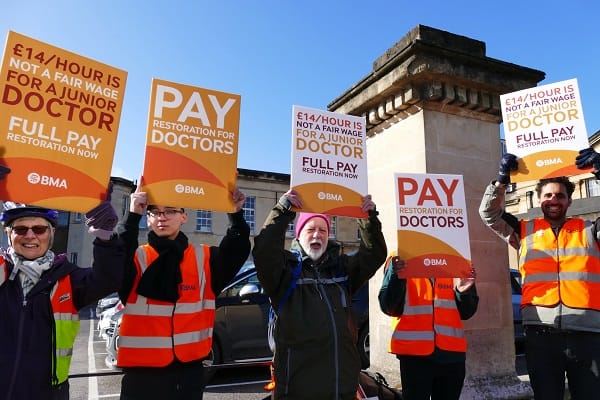New polling from Savanta shows that junior doctors continue to enjoy broad-based support to strike over their pay, ahead of the latest round of industrial action in England.
Over half (53%) of the UK public back junior doctors in their pay dispute, nearly double (28%) those who oppose, with support virtually unchanged from April last year (56%). In particular, younger people under 34 (64%) and 2019 Labour voters (70%) are more likely to be supportive.
In concerning news to the government, the public is also clear that Rishi Sunak’s administration is the most to blame for the industrial action. Nearly half (46%) say it is the government’s fault, versus just 13% who say the blame rests with the junior doctors themselves. This is an increase of five points of those blaming the government (41%) from April 2023.
Chris Hopkins, Political Research Director at Savanta said, “Despite the government’s best efforts, junior doctors continue to enjoy a large amount of support from the public. Our research shows that even on the question of pay – where there has been some pushback on junior doctor’s demands – people broadly back them to get a better deal.”
“More concerning for Rishi Sunak will be that, as far as the public is concerned, blame lies mainly with the government for industrial action dragging on. Governments usually hope that ongoing strike action wears down the public’s support for those taking action, but if anything the opposite seems to be happening here, with more of the public blaming the government than last year.”
“There are also challenges ahead for the Labour Party. Their core voters are particularly supportive of those taking industrial action, despite Labour making clear it is unlikely they would be more generous than the current government. If this becomes Labour’s problem in power, the pressure on them to resolve the situation could be significant.”
For now, the UK public are much more likely to not feel impacted (65%) by recent junior doctor’s strikes then say they have felt the effects (30%).
However, the public does not appear to be hopeful for a resolution. People are evenly split between those saying they believe the industrial action will mean junior doctors will end up with a better pay deal (37%) versus those who believe they will not (41%).
The public is split evenly on whether junior doctors are fully qualified doctors (46%) or are not fully qualified doctors (43%), despite typically being trained for at least five-to-six years.
Savanta also asked the public’s perceptions of other healthcare workers taking industrial action over pay. Nurses had the most public backing, with nearly two thirds (62%) supportive in the event of a pay dispute. Senior doctors and consultants had the lowest amount of support, but UK adults were still more likely to back them striking (44%) than oppose (36%).






Leave a Comment